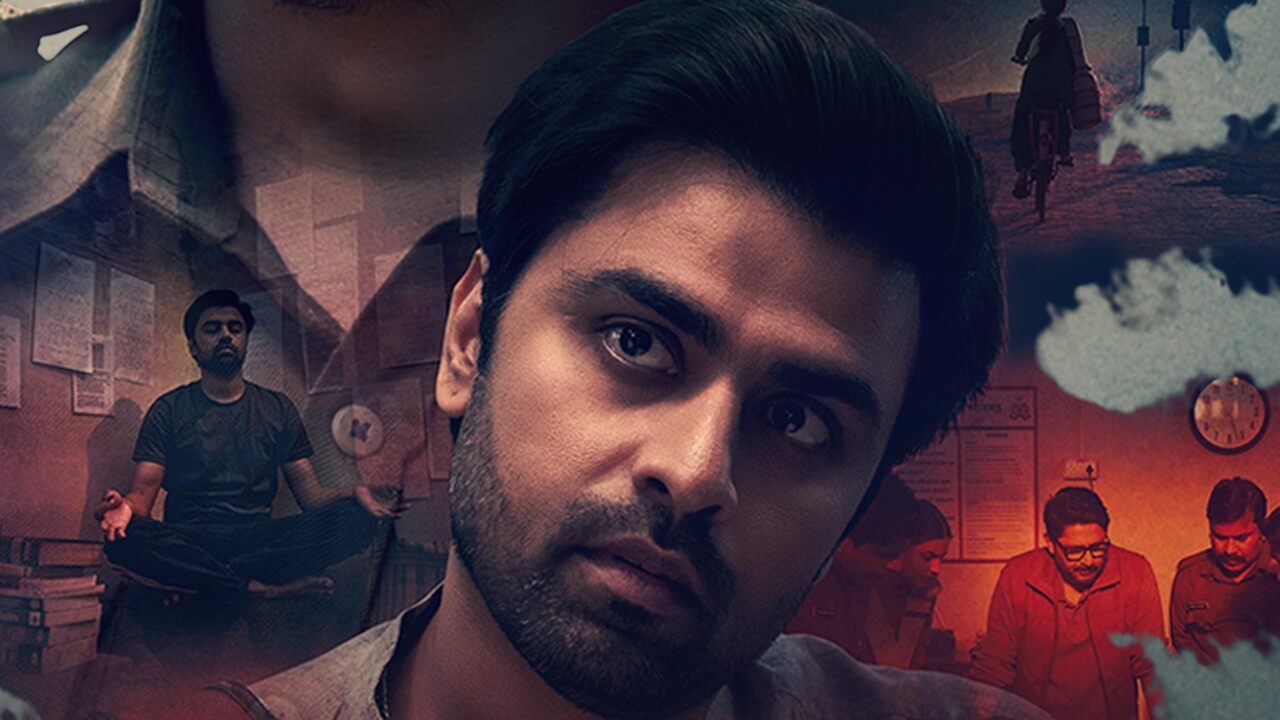
In Bhagwat Chapter One: Raakshas, Jitendra Kumar plays a negative, psychopathic character for the first time in his career. This shouldn't be taken as a sign of a leap in terms of acting. Kumar talks and emotes like Abhishek in Panchayat, Jeetu in Kota Factory, and Meenu in Jaadugar. Those eyes, those expressions remain the same; they are simply transferred to darker areas. The final effect might not leave you awestruck, but it's interesting nonetheless. Kumar's other characters look like Sameer/Rajkumar, and Sameer/Rajkumar look like Kumar's other characters. I started imagining a parallel universe where Abhishek got so frustrated with Bhushan and his gang that he turned into a psycho killer. Or, you know, Jeetu got so tired of motivating his students that he decided to become a serial killer. What do you know, Sameer is a teacher! A science teacher! Is Bhagwat Chapter One: Raakshas the Kota Factory that exists in my parallel universe? The answer, I regret to inform you, is no. Spoilers ahead.
Still, Bhagwat, on its own terms, is a watchable thriller. It's a serial killer story along the lines of Dahaad (both stories draw their inspiration from the case of Cyanide Mohan). A boy and a girl go missing. Communal tensions are fanned by the politicians. A no-nonsense police officer enters the picture, launches an investigation, and discovers the culprit to be a misogynist murderer. What makes Rajkumar a misogynist? His voice carries a distinctly contemptuous tone as he recounts how he trapped a girl who had been rejected by families that came to see her for marriage. "Maine do baatein pyaar se ki, usne I love you suna," Rajkumar says like a man who thinks women are weak and desperate. Is this why he loves his second wife (Tara Alisha Berry) more? When Rajkumar is arrested, she doesn't show much care for him — she merely asks for her jewelry back. While this second wife quickly walks past Rajkumar without looking in his direction, the first one stops in front of him and inquires about his condition. Rajkumar, though, isn't moved by her love. How did this guy manage to get married twice? How did his wives agree to this situation? Rajkumar's personal life isn't imagined with great depth. He is merely portrayed as one of those brilliant, loner killers.
That wouldn't have been much of a dealbreaker if Bhagwat had given voice to its female characters. Meera (Ayesha Kaduskar) and others like her are shown as victims who, with a smile, obliviously walk towards their death. When Meera says that Rajkumar destroyed her dreams, I wanted to ask her what those dreams were because Bhagwat has no time to talk about them or even mention them. The one character who manages to dodge Rajkumar's advances is also merely displayed as a sufferer. This choice makes sense from the story's perspective, but that perspective is impoverished and narrow (Rajkumar's first wife is portrayed as faithful and obedient, while his second is depicted as obsessed with material goods. Both represent stereotypes that exist at opposite ends of a spectrum). By reducing the women to mere casualties, Bhagwat appeals to our most basic instincts to generate sparks of empathy for characters like Meera. The pre-interval portions that should have felt specific through Meera's eyes also end up feeling generic and broad. If nothing else, I would have at least liked to know what ACP Vishwas Bhagwat's (Arshad Warsi) wife thinks about her husband's case. Does she have any thoughts?
If Vishwas imposes a 15-day professional deadline on himself, the movie imposes a moral one on him by showing him as a husband and father. His failure would not merely be a professional defeat; it would make us ask, "How can a man—especially a police officer—protect the women in his own home when he cannot catch a murderer of women?" It's the sort of low-hanging fruit you find in cheap, exploitative works of fiction. But Akshay Shere doesn't come across as an exploitative filmmaker. He, however, looks like a victim of the crime-thriller algorithm (hey, the cop has anger problems). Shere recycles dead tropes and conventions without resuscitating them with fresh vigor. What he has succeeded in making is a film that can stimulate intellectual discussions. The Raakshas in the title refers to Rajkumar, but monsters can be found in almost every corner. The policeman who judges a girl for talking on the phone late at night and the one who mentions her skin color are also raakshas. The politician who gives oxygen to communal conflicts is also a raakshas. The man who runs a prostitution racket is also a raakshas, and the father who considers premarital sex a greater sin than murder is also...you get the point. By the time a lawyer says he's ashamed that society has given birth to a demon like Rajkumar, you nod your head in agreement. Rajkumar is the product of a society that sees women in narrow, confined roles — a society capable only of burning the effigy of Ravana, while the real Ravanas watch the spectacle from a distance. Shere crafts a twisty, fine cat-and-mouse game, yet he, too, like the society he condemns, views women through a simplified lens. If he points one finger at the culprits, he forgets that the others point in his direction.
Final Score- [4.5/10]
Reviewed by - Vikas Yadav
Follow @vikasonorous on Twitter
Publisher at Midgard Times
Hi Everyone, after a due consideration, we have decided that we will be open for donations to help us in managing our website. We will be greatful for any kind of amount we receive. Thanks!
— Midgard Times 🎬 (@Moviesr_net) January 4, 2026
PayPal- [email protected] pic.twitter.com/DlNNz5Npm5
Get all latest content delivered to your email a few times a month.
Bringing Pop Culture News from Every Realm, Get All the Latest Movie, TV News, Reviews & Trailers
Got Any questions? Drop an email to [email protected]